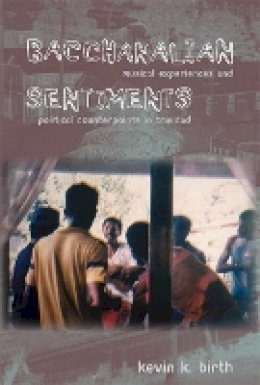Kevin K. Birth is Associate Professor of Anthropology at Queens College, City University of New York. He is the author of “Any Time Is Trinidad Time”: Social Meanings and Temporal Consciousness.
“Bacchanalian Sentiments explores the multiple ways that music, politics, and ethnicity intersect in Trinidad, and it does so through a deeply engaging and highly nuanced ethnography of a rural community located near Sangre Grande.” - Timothy Rommen, Journal of Anthropological Research “This book makes gains for a wider audience across disciplines and geographic focuses. . . . As one who is concerned with culture and nationalism, I believe that Birth's exploration of Trinidadian sense of nation drawing on ethnographic research in rural villages serves as a reminder that colonial Trinidad was divisive but relatively fluid, causing constant dialogues between different segments. This has been seriously disregarded in the urban- and state-focused studies of 'nation-building'.” - Teruyuki Tsuji, Journal of the Royal Anthropological Institute “I recommend Bacchanalian Sentiments highly to those searching for new approaches to the representation and analysis of expressive culture. It is an important contribution to Caribbean anthropology and ethnomusicology due to its emphasis on music’s affectivity and the close relationship between the experience of music and the region’s political history. This text is an important addition to the literature on Trinidad and Tobago’s history. . . .” - Patricia van Leeuwaarde Moonsammy, Journal of Latin American and Caribbean Anthropology “Bacchanalian Sentiments certainly does contribute to the canon of anthropological writing on the Caribbean.” - Dylan Kerrigan, Caribbean Review of Books “Birth’s Bacchanalian Sentiments. . . seamlessly synthesizes rich observation with a rigorous, compelling and theoretically innovative analysis of music and political community. . . . Birth’s study makes an original contribution to debates on music in Trinidad, and to wider discussions on pluralism and creolization in the Caribbean and on racialized subjectification.” - Yasmeen Narayan, Ethnic and Racial Studies “Integrating a wealth of ethnographic observations of life in rural Trinidad, Kevin K. Birth offers a rich analysis of how performers and audiences actually experience and interpret music in Trinidad. He demonstrates how central musical experience is to the diverse and changing ways that Trinidadians understand various dimensions of their lives, such as kinship, friendship, community, gender, ethnicity, and national identity.”-Stephen Stuempfle, author of The Steelband Movement: The Forging of a National Art in Trinidad and Tobago “Kevin K. Birth persuasively argues that previous scholarship has concentrated too much on text, discourse, and even performance analysis, avoiding the more challenging questions of reception and use. The few existing studies of reception have tended to be overly theoretical. Birth goes significantly beyond these studies, offering a rich portrait of the way popular music informs and structures everyday life.”-Bryan McCann, author of Hello, Hello Brazil: Popular Music in the Making of Modern Brazil “Bacchanalian Sentiments certainly does contribute to the canon of anthropological writing on the Caribbean.” - Dylan Kerrigan (Caribbean Review of Books) “Bacchanalian Sentiments explores the multiple ways that music, politics, and ethnicity intersect in Trinidad, and it does so through a deeply engaging and highly nuanced ethnography of a rural community located near Sangre Grande.” - Timothy Rommen (Journal of Anthropological Research) “Birth’s Bacchanalian Sentiments. . . seamlessly synthesizes rich observation with a rigorous, compelling and theoretically innovative analysis of music and political community. . . . Birth’s study makes an original contribution to debates on music in Trinidad, and to wider discussions on pluralism and creolization in the Caribbean and on racialized subjectification.” - Yasmeen Narayan (Ethnic and Racial Studies) “I recommend Bacchanalian Sentiments highly to those searching for new approaches to the representation and analysis of expressive culture. It is an important contribution to Caribbean anthropology and ethnomusicology due to its emphasis on music’s affectivity and the close relationship between the experience of music and the region’s political history. This text is an important addition to the literature on Trinidad and Tobago’s history. . . .” - Patricia van Leeuwaarde Moonsammy (Journal of Latin American and Caribbean Anthropology) “This book makes gains for a wider audience across disciplines and geographic focuses. . . . As one who is concerned with culture and nationalism, I believe that Birth's exploration of Trinidadian sense of nation drawing on ethnographic research in rural villages serves as a reminder that colonial Trinidad was divisive but relatively fluid, causing constant dialogues between different segments. This has been seriously disregarded in the urban- and state-focused studies of 'nation-building'.” - Teruyuki Tsuji (Journal of the Royal Anthropological Institute)

